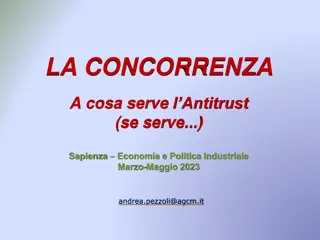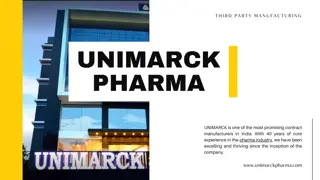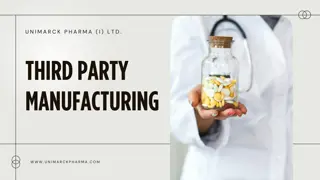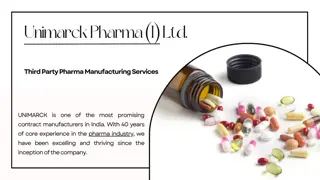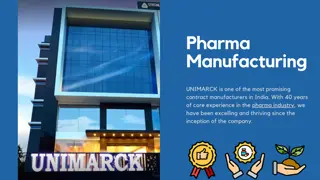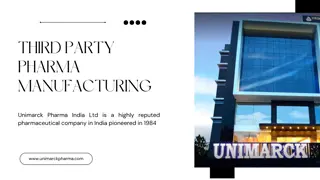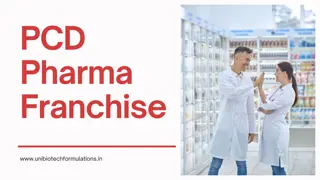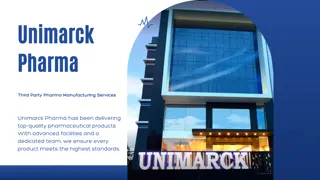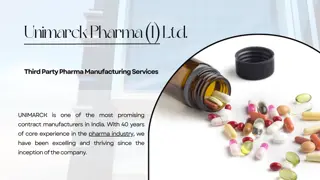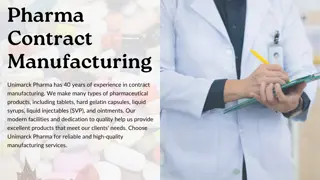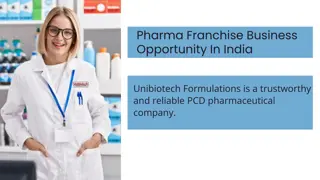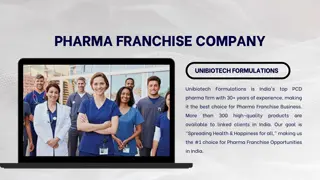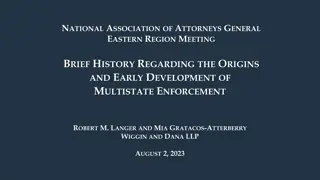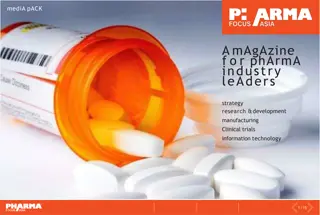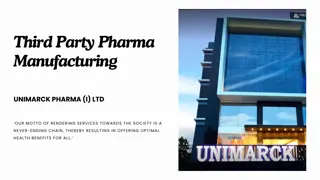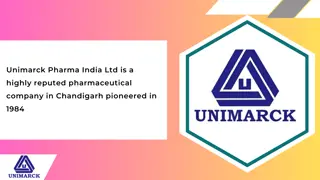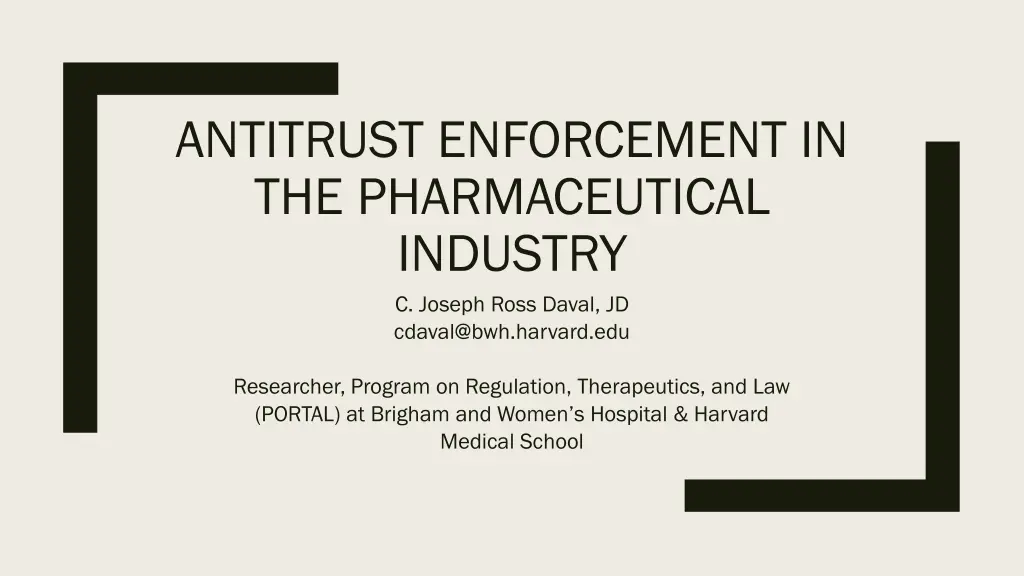
Antitrust Enforcement in Pharmaceutical Industry by Joseph Ross Daval
Explore anticompetitive behavior, pay-for-delay settlements, and the FTC's authority in the pharmaceutical industry as discussed by researcher Joseph Ross Daval. Discover the impacts on drug prices, patient costs, and regulatory actions. Learn about recent FTC actions and methods for searching FTC legal actions related to pharmaceutical markets.
Download Presentation

Please find below an Image/Link to download the presentation.
The content on the website is provided AS IS for your information and personal use only. It may not be sold, licensed, or shared on other websites without obtaining consent from the author. If you encounter any issues during the download, it is possible that the publisher has removed the file from their server.
You are allowed to download the files provided on this website for personal or commercial use, subject to the condition that they are used lawfully. All files are the property of their respective owners.
The content on the website is provided AS IS for your information and personal use only. It may not be sold, licensed, or shared on other websites without obtaining consent from the author.
E N D
Presentation Transcript
ANTITRUST ENFORCEMENT IN THE PHARMACEUTICAL INDUSTRY C. Joseph Ross Daval, JD cdaval@bwh.harvard.edu Researcher, Program on Regulation, Therapeutics, and Law (PORTAL) at Brigham and Women s Hospital & Harvard Medical School
Acknowledgements Co-authors: Aaron Kesselheim, Ameet Sarpatwari, Alexander Egilman Funding: Arnold Ventures
Anticompetitive behavior in the pharmaceutical industry Driver of high drug prices in U.S., increased costs to patients and system Brand manufacturers delaying generic competition Product hops: brand name manufacturers shift patients to different brand- name drugs in the face of impending generic competition $4.3-6.5 billion for 2.5 years of delayed generic competition for MS drug glatiramer acetate (Rome et al)
Pay-for-Delay Settlements Agreements between brand and generic drug manufacturers settling patent litigation, involving a reverse payment by the brand to the generic to delay the date of generic entry Annual cost estimates: $6.2 to $37.1 billion (Robin Feldman, The Price Tag of Pay-For-Delay 2022) $3.5 billion (FTC, 2010) FTC v. Actavis (2013): Reverse payments subject to antitrust scrutiny under rule of reason Rejected scope of patent test (dissent and defendant manufacturer) Rejected quick look presumptively unlawful test (FTC)
FTCs Authority and Recent Actions Enforcement actions Enforcement actions. To prevent Unfair methods of competition or Unfair or deceptive acts or practices Internal administrative proceeding or lawsuit in federal court Merger review Merger review. FTC can block or place conditions on mergers that may lessen competition, tend to create a monopoly, or unreasonably restrain trade Can require divestitures, in which FTC allows the companies to merge if they sell a drug to a third-party competitor Rulemaking Rulemaking. Recent FTC actions: improper Orange Book patent listing challenges (under Biden and Trump), PBM insulin administrative complaint 2024
Methods for FTC search Legal actions initiated or concluded by FTC from 2000-2022 related to pharmaceutical market Search of FTC s Legal Library using filters prescription drugs, pharmaceuticals, drug stores and pharmacies, and over the counter drugs and devices Manual review of each result, as well as each entry in 2023 FTC report Overview of FTC Actions in Pharmaceutical Products and Distribution Collected information from press releases, complaints, orders, motions, opinions.
Results: FTC actions against drug manufacturers 2000-2022 22 enforcement actions (~1 per year) 29 outcomes: 23 settlements, 4 court judgments, 1 final FTC order, 1 withdrawal by FTC 10 outcomes included monetary payment, totaling $1.6 billion ($1.2 billion from Cephalon for Provigil settlement) 62 merger actions (~3 per year) 61 permitted with conditions, 58 (95%) requiring divestment of drugs 1 rule, deeming certain patent assets to be reportable for antitrust review Challenged by PhRMA, upheld in court
29 outcomes: 23 settlements, 4 court judgments, 1 FTC order, 1 action withdrawn by FTC Of the 4 court judgments, FTC lost 3, won 1 (Shkreli) 10 (34%) involved monetary payment, totaling $1.6 billion $1.2 billion in the Cephalon case, which went to a settlement fund to compensate payers that overpaid for the stimulant modafinil (Provigil) as a result of alleged anticompetitive settlements of patent litigation delaying generic competition 9 equitable payments (disgorgement, restitution) 1 monetary penalty ($2.1 million)
FTC required divestiture of 332 drugs: 184 (55%) approved generics, 95 (29%) generics in development, 38 (11%) approved brand-name, 15 (5%) investigational brand-name Largest: 79 drugs from 2016 Teva acquisition of Allergan s generic arm Trends: Overall decrease after 2017, a decrease in brand-name divestitures since the early 2000s, and a rise and fall in generic divestitures from 2007-2017
Next: private antitrust litigation against drug manufacturers Gathering a cohort of all lawsuits, including private lawsuits, alleging antitrust violations against drug manufacturers ~217 cases pending in federal district court anytime from 2009-2025 54 are antitrust counterclaims alleged by defendants in patent litigation Of plaintiff antitrust allegations (163, ~6/year): 5 plaintiff wins (3%) 31 defendant wins (19%) 127 settlement likely (78%)
Discussion Small financial payments recovered relative to rewards of anticompetitive conduct Enforcement v. actual misconduct FTC annual reports on brand-generic settlements, up to 40/year (2012) involve compensation and restrictions on generic entry Resource constraints: FTC Health Care Division has ~40 lawyers and investigators Legal constraints on recovering money: AMG v. FTC (2021), limited retroactive relief Untested authorities: Unfair methods of competition rulemaking: [I]t is fair to consider whether the FTC might have been more effective in targeting pay targeting pay- -for for- -delay settlements through both adjudication and rulemaking delay settlements through both adjudication and rulemaking . . . For an agency with scarce resources, it will be important to carefully analyze whether investing time and effort into rulemaking might be a better use of limited resources resources than many years of intense and expensive litigation. Rohit Chopra & Lina Khan, The Case for Unfair Methods of Competition Rulemaking, 2020 more effective in better use of limited

